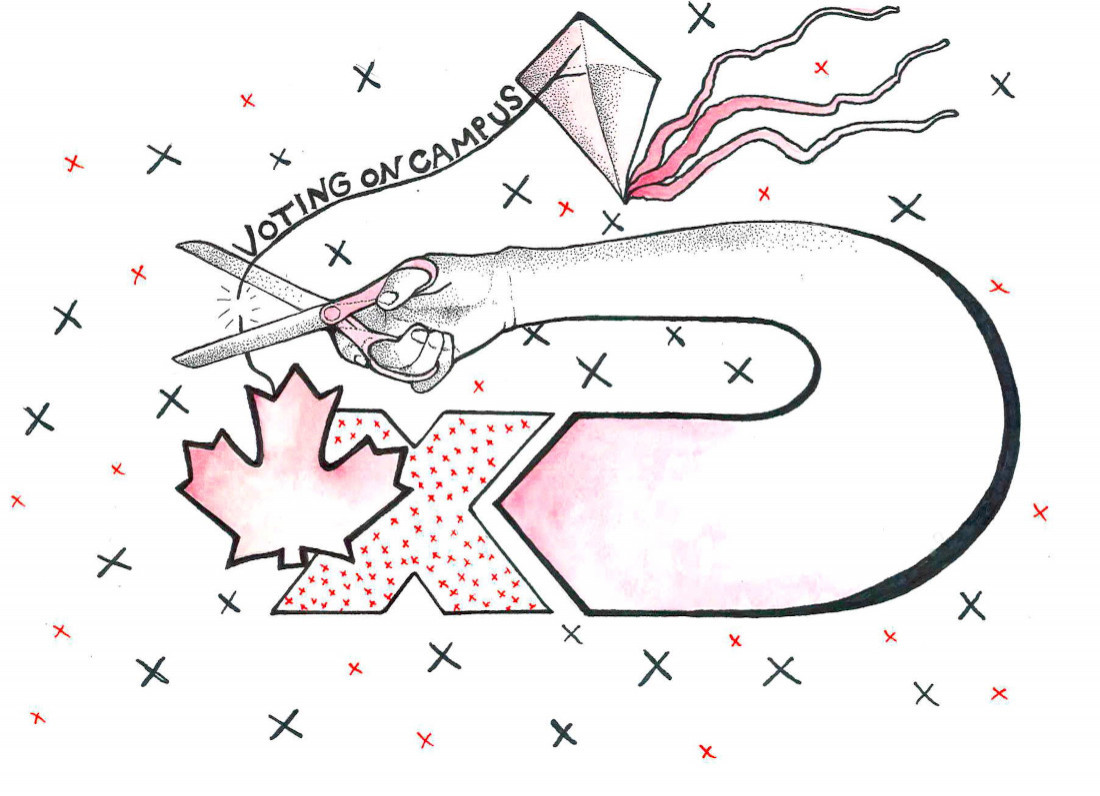The feds giveth, and the feds taketh away
Vote-on-campus program suspended after two elections of success
While liberal and conservative political commentators alike characterize youth in post-secondary programs as politically engaged in the extreme, voter turnout rates over the past 30 years suggest that while the youth (typically defined as those between 18 and 24 years of age) vote is currently the largest voting bloc by age, young people have been casting fewer and fewer votes since the 1990s.
That trend seemed to reverse when Elections Canada introduced the Vote on Campus program in 2015, which set up special polling stations on university campuses that allowed students to vote in their home riding. Alexandra Koslock, president of the Canadian Federation of Students - Manitoba (CFSMB), says the program “increases accessibility and decreases some of the barriers experienced by students.”
Youth voter turnout numbers suggest the program was extremely successful, with youth voting rates rising from 38.8 per cent in the 2011 federal election to 57.1 per cent in the 2015 federal election, and over 70,000 votes cast through the Vote on Campus program.
Koslock says that, so far, CFSMB “continues to hear from students on the ground that they’re excited, and they’re looking forward to voting for their leaders in this election that represent their values.”
She cites honouring Indigneous learners’ right to education, free post-secondary, debt alleviation, climate change, post-COVID-19 recovery inclusive of post-secondary students, as well as alleviating barriers to international students, including access to publicly funded, barrier-free healthcare systems and tuition rates similar to domestic students as key issues for students.
On Aug. 25, Elections Canada announcedv via Twitter that they would not run the Vote on Campus program for the 2021 federal election. The tweet cited “the challenges brought on by the pandemic and the minority government situation” as reasoning for the program’s suspension.
As of the writing of this article, the original tweet has over 1,000 quote tweets and comments, many criticizing the decision, either by accusing Elections Canada of suppressing votes or inquiring what impact “the minority government situation” would have on a voting accessibility program.
Marie-France Kenny has some clarifying answers. Kenny, who is the regional media advisor for Elections Canada in Manitoba and Saskatchewan, says the program is not being run because of planning issues and a lack of legal mandate.
“Whenever we finish an election, we already start planning the next election. It takes a long time to figure out dates, locations, where we’re going to set up offices and to figure out and work with campuses and colleges. It takes a lot of logistics,” she says. “Because this is not a fixed-date campaign, and because it’s a short time span, there was not enough time – and with the pandemic, not enough resources – to ensure polling locations on campuses.”
Kenny also says that varying mask and vaccination policies on each campus has made it difficult to organize polling stations with post-secondary administrations, as each station would require unique protocols. “Everything evolved very quickly, and it became clear that it was impossible to do. It was looked at from every angle,” she says.
At the national level, the Canadian Federation of Students (CFS) is advocating for the right to vote on campus to become law. Elections law can mandate that Elections Canada set up polling stations in specific locations, and it does require stations be set up in long-term care facilities for seniors or people with physical disabilities. Kenny says this was another reason for the cancellation of the program. It wasn’t legally required.
Kenny also cites the reduced numbers of students on campus as a reason for the cancellation of the program. She says Elections Canada is still trying to set up advance polling stations on campuses but stresses that figuring out logistics with each campus and landlord is challenging.
“It was something that was dear to the staff at Elections Canada,” Kenny says. “Making sure that students could vote has been one of the priorities of Elections Canada.”
Koslock says “this decision of no voting stations on campus just shows, in our opinion, that they’re not a priority to the government and to Elections Canada.”
“Youth voters genuinely often believe that their vote doesn’t matter, and it won’t make a difference,” she says. “I think COVID-19 has posed significant barriers for students in post-secondary education, and now being faced with not being a priority by Elections Canada or the government to have accessibility in voting is unfortunate.”
“If Elections Canada is rolling back a program that they introduced, that they identified as necessary to increase the youth voter turnout, what are they doing in turn?” she asks. “Are they actually going to stand by what they said and place polling stations in student-populated neighbourhoods? We hope to see that they’re doing something to increase fair and equitable access to voting for students.”
Koslock says CFS has initiated their GenerationVote or GenV campaign to help students understand how and where they can sign up to vote and the positions and promises of the political parties, so that they can make informed voting decisions. CFS will also use the campaign to share information about debates that are particularly relevant to students and any other election updates. If Elections Canada and the federal government are committed to showing students that their votes matter, Koslock suggests setting up polling stations on campuses and having multiple polling stations where students live.
The federal election is on Sept. 20. To register to vote, go to elections.ca. Sept. 14 is the deadline to apply for a special ballot, which you will need if your home riding is different from the one you currently live in. Your local polling station will have its own days set for advance voting. To learn more, visit elections.ca or cfs-fcee.ca/genv-faq/.
Published in Volume 76, Number 1 of The Uniter (September 9, 2021)







